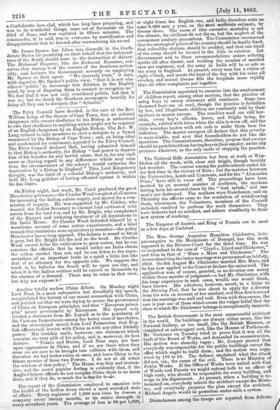On Friday night, last week, Mr. Caird produced the great
Manchester grievance—Sir Charles Wood's neglect of all means for increasing the Indian cotton supply, and moved for a com- mission of inquiry. He was supported by Mr. Cobden, who wanted the Indian Secretary to exempt land cultivated with cotton from the land-tax, and by Mr. Bright, who complained of the flippant and irritating treatment of all deputations to the Lathe House. Sir Charles Wood defended himself by a wearisome account of some cotton experiments, and a brief remark that remissions were equivalent to bounties—the policy Manchester has so long opposed. The defence is sound so far as it goes, but Mr. Bright hit the nail on the head. Sir Charles Wood cannot bribe the cultivators to grow cotton, but he can convince the officials that he would rather see India obtain the cotton market than not, and he can listen to the repre- sentations of an important trade in a spirit a little less like that of an attorney for the opposite side. We suppose the truth is, he believes the South will be open one day, and when it is the Indian cottiers will be ruined in thousands by the absence of a demand. There may be sense in that view, but why not express it ?



































 Previous page
Previous page